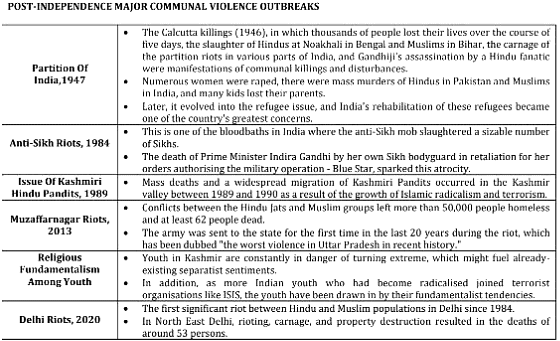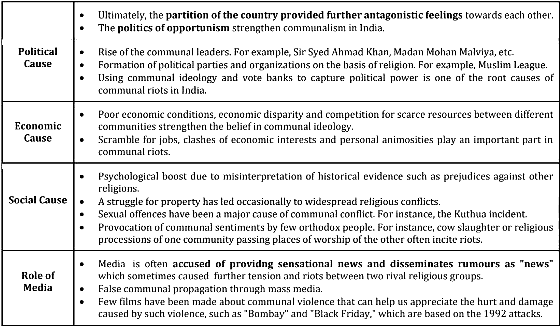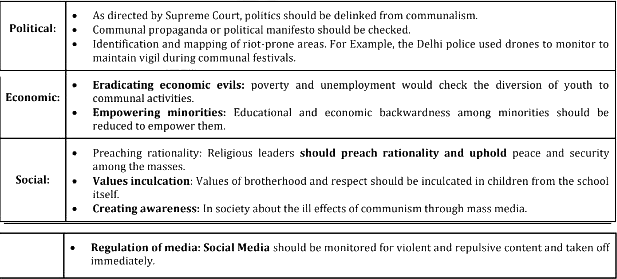UPSC Exam > UPSC Notes > Indian Society for UPSC CSE > Communalism
Communalism | Indian Society for UPSC CSE PDF Download
“The antagonism practiced by the members of one community against the people of other community and religion can be termed as communalism” – Ram Ahuja
Communalism is an ideology with a strong attachment to one's own community while disregarding other communities’ ideologies. Communalism is a belief system that a group of people who practice a particular religion share similar social, political, and economic interests.
Various Stages of Communalism
- Mild Stage: It is the belief that people who follow the same religion have common secular interests i.e. common political, cultural, and social interests.
- Moderate Stage: When the secular interests of followers of one religion in a multi-religious society like India are not similar and divergent from the interests of the followers of another religion.
- Extreme Stage: Interests of different religious communities are seen to be mutually incompatible, antagonistic, and hostile.
Post-Independence Period
- Colonialism was one of the root causes for the emergence of communalism in India which remained the biggest threat to the secular fabric of our nation.
- Various factors such as caste-based politics, economic divide, restricted opportunity, lack of social acceptance of depressed class and so on, strengthen the roots of communalism in post-independent India.

Causes of Communalism in India


Consequences of Communalism
- Hinders economic progress: Communal violence obstructs economic development, social progress, cultural assimilation and political tolerance. According to the Global Peace Index (2022), India ranked 72nd, and the economic cost of violence is as much as 6% of GDP.
- Threatens National unity: People are guided by vested and narrow interests due to communalism, they tend to prioritise community interest over the national interest.
- Against the spirit of democracy: Unlike communalism, democracy crosscuts the barriers of caste, class or any other forms of inequality.
- Threatens demographic dividend: The flow of labour from productive activities is diverted to unproductive activities; this kills the vibrant demography in communal violence.
- Sow suspicion in society: Communalism sows the seeds of suspicion among the members of society which puts the community at a disadvantage. For instance, Muslims were denied medical treatment for being suspected as ‘Superspreader’ during Covid-19.
Step to Check the Growth of Communalism

Way Forward
- Promotion of Secularism: Promotion of secular ideas and practices as it seeks to do political justice to the identities of India's various linguistic and cultural groups.
- Building Healthy Public Opinion: Healthy Public Opinion must be built among the masses by motivating and educating the people.
- Vulnerability mapping: Mapping of violence-prone areas and communities for better regulation of law and order situation of the region.
- Encouragement of Inter-religious Marriages: Inter-caste marriages would herald a new beginning by putting an end to the practice of inferiority/superiority because of the closer type of social interaction and intermixing among different communities and caste groups.
- Upholding cultural diversity: Cultural diversity among religions must be upheld and respected by people of other communities.
- Strict actions: Strict legal actions must be taken against an individual/ group who incites communal tensions or take part in violence.
- Delinking communal identity and politics: This would check increased instances of communal violence during elections and the use of communal marks for vote banks.
- Participation of other stakeholders: As participation of media, civil societies, and NGOs to eradicate communalism from India.
To conclude, in order to get rid of the evil of communalism, collective efforts and prompt discharge of duties should be upheld. If we do so, harmony will definitely prevail. This must be done as this was the dream of Mahatma Gandhi for a “free India”.
The document Communalism | Indian Society for UPSC CSE is a part of the UPSC Course Indian Society for UPSC CSE.
All you need of UPSC at this link: UPSC
|
21 videos|125 docs
|
FAQs on Communalism - Indian Society for UPSC CSE
| 1. What is communalism in the context of Indian society? |  |
Ans. Communalism in the Indian context refers to the belief or practice of promoting harmony and cooperation between different religious or ethnic communities. It often involves the manipulation of religious or ethnic identities for political gain.
| 2. How does communalism impact society and politics in India? |  |
Ans. Communalism in India has contributed to social divisions, violence, and political polarization. It has been used by political parties to mobilize support along religious lines, leading to tensions and conflicts between different communities.
| 3. What are some examples of communal violence in India in recent years? |  |
Ans. Recent examples of communal violence in India include the 2013 Muzaffarnagar riots in Uttar Pradesh and the 2020 Delhi riots. These incidents resulted in loss of lives, destruction of property, and deepened communal tensions.
| 4. How can communal harmony be promoted in Indian society? |  |
Ans. Communal harmony can be promoted through education, interfaith dialogue, cultural exchange programs, and strict enforcement of laws against hate speech and incitement of violence. Building trust and understanding between communities is essential for fostering peace and harmony.
| 5. What role do political leaders and institutions play in combating communalism in India? |  |
Ans. Political leaders and institutions have a crucial role in combating communalism by promoting secularism, condemning hate speech, and upholding the rule of law. It is important for leaders to prioritize unity and diversity over divisive politics for a harmonious society.
Related Searches





















